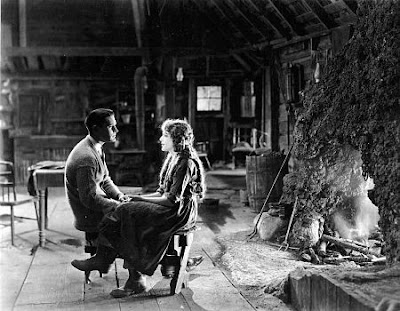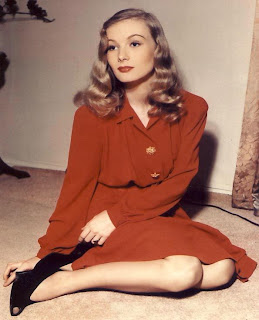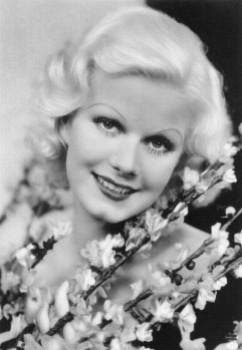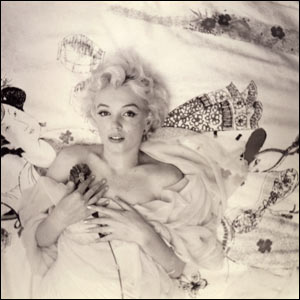Olivia de Havilland eyes the baby she was forced to give up in
To Each His Own.
Tess of the Storm Country:
(I saw the 1922 version of this film, starring the incomparable Mary Pickford, thinking it was the only one. However, upon further investigation, it appears that this film alone has been made and re-made several times, the first of which was in 1914, also starring Ms. Pickford. Future versions were made in 1932 with Janet Gaynor and in 1960 with Diane Baker. As it is based upon a novel by Grace Miller White, I suppose the continued use of the story makes sense. However, I will refer to the 1922 version, as this is the only one I have viewed).
The plot of this movie involves a backwoods girl, Tess, who is squatting with family on the wealthy Elias Graves's land. Needless to say, Elias tries to remove the impoverished nuisances from his property. The usual battle of rich versus poor ensues, and in the meantime, Frederick Graves, son of Elias, becomes fond of Tess and takes her side in the argument. Meanwhile, Fred's sister Teola becomes pregnant out of wedlock by a law student who is quickly murdered, and thus unable to marry her and make the baby legitimate. Humiliated and suicidal, Teola is desperate. Enter Tess, who out of her good heart pretends that the newborn baby is her own to save Teola's face. The only problem is that now Frederick thinks that the girl he was falling for is really a no good scamp. Fred turns his back on Tess, and so Tess is left alone to raise the baby. The truth is eventually discovered when Tess brazenly tries to baptize the child herself after being initially denied the privilege by the church-- it's a bastard child, after all-- and Teola and Elias witness the event. Teola is so moved that she spills the beans and confesses that the baby is hers. Fred feels like a cad and apologizes to Tess, whom despite her low class has more courage and goodness in her than anyone in his elite circle. After declaring his undying love, the two embrace, the two feuding families call a truce, and everyone lives happily ever after.
Tess and Fred, played by Lloyd Hughes, fall in love.
The plot of the film is quite bold in that it makes the unwed mother a sympathetic character, however it is still the innocent Tess that is lauded as the true hero. Yet, what she symbolizes also speaks volumes: the hypocrisy of prejudice. Tess is labeled as something she is not, and is shunned by the man she loves. The world looks down on her, but considers her behavior typical of a woman of "her kind," meaning poor, uneducated, and uncouth. By the end, we learn the age old lesson, "don't judge a book by its cover." Tess not only possesses more grace than the upper classes that are judging her, but it is also one of their own that is the true culprit of immoral behavior, Teola. The guilt of blaming one woman for another's crimes, and the imminent death of Teola, who dies shortly after her revelation of motherhood, causes people in the community to open their eyes and rethink the harshness of their own criticisms. If you live in a glass house, don't throw stones. So, the movie preaches open-mindedness, while at the same time being church-friendly in suggesting that we all try to be "good"-- it is much better to be a Tess than a Teola. The movie itself is an entertaining silent, and one of The best of Mary Pickford's remaining gems.
"It":
Lord love Clara Bow (right). This 1927 movie will forever be the one most associated with one of the hottest flappers to ever va-va-voom onto the silver screen. Clara wasn't known for her dancing, of course, but for her electric presence, which sizzled in the camera's adoring eye. This film was fashioned for her with the help of Elinor Glyn as a publicity campaign to boost the already rising star. Clara was labeled as the "It" girl: one completely possessing of that mysterious X-factor that separates the superstars from the rest of us civilians. Many are familiar with the concoction of Clara's title as "the It girl," but few are familiar with the film that awarded her this stamp. Upon comparison, it is quite clear that it is, or rather was, a more modernized version of Tess of the Storm Country but in the raw and bustling environment of the roaring twenties.
This time around, Clara stars as Betty Lou, a single working girl trying to get by, who has a job behind the counter of a posh store. Brimming with energy despite her financial woes, Betty is Miss Congeniality as far as her friends are concerned, but her low class keeps her from her recent crush-- the store Manager, Cyrus Waltham, Jr (Antonio Moreno). Cyrus is already involved with another woman, but when he finally notices the lovely Betty Lou, he can't help but be taken in. She takes him out for a night of fun at Coney Island, where for once he gets to let his hair down. However, things turn sour when he leans in for a kiss only to receive a slap-- Betty Lou isn't that kind of girl! Cyrus is a bit shocked, but still intrigued. However, any of Betty Lou's plans are foiled when her roommate gives birth to an illegetimate child, only to have welfare workers threaten to take it away. Betty Lou steps in, claims the child as her own, and insists that she is able enough to take care of it. Now, Betty has to walk around with a scarlet T on her face (T for Tramp), and any chances of love between her and Cyrus are ruined-- the heir to a fortune can't be swindled by some hussy who's clearly only out for a good time, particularly when she teased him with that left hook!
Clara shows her sales skills (to William Austin).
Instead, Cyrus offers a compromise: since she's obviously a loose woman, Betty can settle for being his mistress. She does not take well to this suggestion, believing that his love for her should be enough to see through any alleged past mistakes she's made, and at the very least he should not insult her with such an offer! Cyrus chooses appearances over love and kicks Betty to the curb, but she's not to be outdone. She shows up at a party on his yacht, seducing him with her innocent wiles once again, and she gets her sweet revenge when he finally proposes marriage. She tosses it back in his face with a defiant "Thanks, but no thanks" and secures her pride once more. Afterward, she and Cyrus are thrown overboard, and they find themselves in each other's arms. Now that Betty Lou has taught Cyrus a lesson, and he knows the truth about the baby, they reconcile and live happily ever after. Again, the same themes of upper class hypocrisy and lower class... class. We see that Betty is more moral than those financially and socially superior to her in that she refuses Cyrus's attempts to make a whore of her, consequently making him the true embarrassment. Compassion for the unwed mother is too explored, but just as Tess, Betty Lou is put on a pedestal for her ability to be both decent and demure. Her raw sexual magnetism too makes a statement that a woman can be sexy without being a mere sex object. In both this and the aforementioned film, the baby and its destiny is less important than how it effects others' lives or at least the images of them. A silent classic, this too is one of the leading lady's best.
Bachelor Mother:
Baby makes three in 1939 with Ginger Rogers, David Niven, and everyone's favorite character actor, Charles Coburn. Hereafter, the plots remain quite similar to It in that the main character is a shopgirl trying to make a living who gets caught up in a case of mistaken motherhood instead. Love, of course, is always found in the process. Thus, Ginger stars as Polly Parrish, working at J.B. Merlin's department store (left). Polly is fired over the Christmas holiday, and soonafter sees a baby that has been left on the stairs of an orphanage. Fearing that it is going to roll right off and be injured, she hurries to pick it up. The baby is mistaken as her own, and she is left to care for it and defend the fact that the little thing isn't even hers. JB (Coburn) gives Polly her job back, feeling guilty about firing an unwed mother, especially during the holiday, and his son, play-boy David (Niven), becomes equally involved in the welfare of the baby and its mother. As a relationship between Polly and David grows, she no longer tries to deny that the baby is hers, if only because it is the one thing that keeps David in her life. He equally falls for her, but is too snobbish to admit that he has fallen for a lowly shop girl, let alone one with an illegetimate kid-- nevermind the fact that the Lothario probably has had his own fun around town. More hurdles are thrown into the mix when a search for the true father is begun, which includes JB's belief that his son is the true father. David is surprised to find this out, but is delighted to discover that his dad is fairly happy at the prospect of having a grandson and eager to have him settle down and make the family legit. David, after initially insulting Polly, finally admits his true feelings to himself and thus to Polly and Baby John. Soon enough, the fictional family becomes a real one. With this description, I can immediately jump to the next film, for it is a direct re-make.
Bundle of Joy:
In 1956, Bachelor Mother was remade as a musical to showcase the talents of married sweethearts Eddie Fisher and Debbie Reynolds, as well as to capitalize on the fact that the two had had their first child (Carrie Fisher). This film, therefore, has the exact same plot as the one mentioned above, but with more musical numbers. This time, Debbie is Polly and Eddie is Dan Merlin. Adolphe Menjou steps in as wealthy store manager, and proud grandpapa, JB Merlin. Both Bachelor and Bundle have their merits, but Bundle is more obviously cheesy. Debbie is her usual sunshine self, and her gift at comedy and charm is the saving grace of the film. Eddie does well enough, but doesn't possess the same charm as David Niven. Ginger, of course, is superb as ever in the earlier film, and it is her performance-- with a keen sense of timing and strong delivery-- that makes Bachelor a more graceful interpretation.
Modern family: David and Ginger play house.
The alterations in the script in these latter films make the male character a bit more likable in that he tries to become a part of the child's life from the beginning, even if just as a make-shift uncle, rather than turning up his nose in disgust and running away. The relationship between the leading actor and actress comes about because of and not in spite of the baby, as opposed to the first two films, and a sense of family is professed over that of romance, (though in Bachelor and Bundle the writers would have us believe that the two go hand in hand). In the enforced production code era, it should come as no surprise that the ideal set-up of husband, wife, and baby be extolled, and in both movies the sad mother who abandoned her child is never even seen by the audience. It is much nicer to just pretend that she doesn't even exist, and that no out-of-wedlock sex was ever engaged in. The child, therefore, just dropped from the sky. Indeed, sex is not an issue, especially in Bundle, where innocent kisses between Eddie and Debbie take the place of the sexual propositions of It. Thus, with the first two films, we are taught more of a lesson about social hypocrisy and moral prejudice and with Bundle we are taught "family first." Bachelor is somewhere in between. Also, the theme of mistaken identity plays a much bigger part to the central plot of the movie in the last two features than in the first two, wherein it was just another log on the fire to much bigger shenanigans.
It is difficult to recommend just one of these films, for they all have good points and are equally entertaining. However, as I am an obvious Clara Bow fan, It remains my favorite. If I were to suggest one of the latter two, I would offer up Bachelor Mother, if only for performance's sake. It is interesting to investigate these films, to watch them chronilogically, and to witness how clearly social attitudes changed with the times. The silent duo are more free and uninhibited, if only because they arrived before 1934's production code and the disarming alterations of the great depression. They too are a bit more ballsy, with Mary being brazen and almost naively heroic, and Clara pushing the envelope further by adding a dash of sex appeal into the mix. Their heroics were done not necessarily for any great moral stance, but simply because it was the right thing to do. The latter two films come after the end of the hooplah twenties, but Bachelor maintains a little more naughtiness than Bundle, which is pretty much family fun from concentrate. In Tess we were taught to stand for something, in It we were taught to stand up for ourselves, in Bachelor Mother we're encouraged to simply try to stand still while the chaos ensues around us, and in Bundle of Joy we're lectured to stand as a family unit. I guess the film you relate to the most, will equally tell you where you stand.
Have a Happy New Year!!!










































